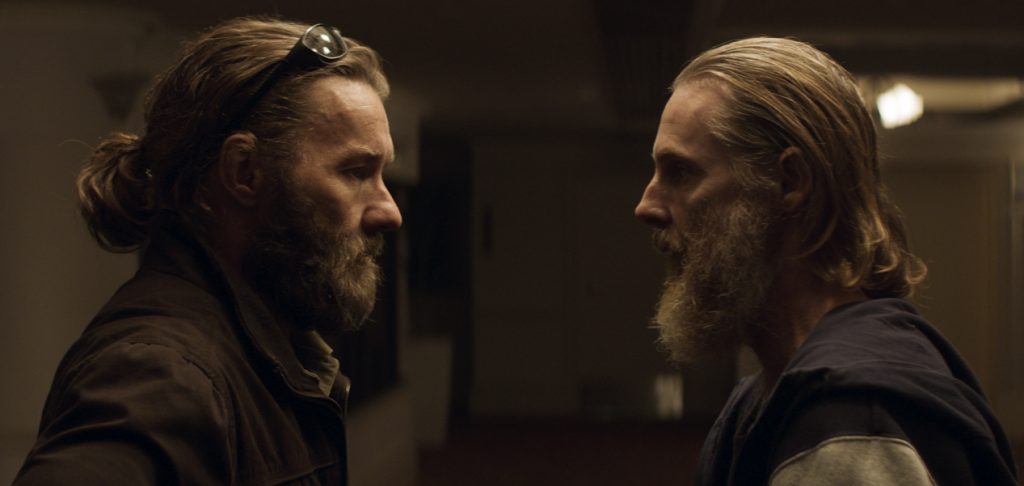Joel Edgerton and Sean Harris are not as they appear in Thomas M. Wright’s quietly terrifying sophomore feature, The Stranger. Based on one of the better-known true crimes of early 2000s Australia (and if you’ve managed to avoid the trailer or synopsis, the a-ha moment packs a subtle punch), the film follows two men and the apparent roles they play in an abduction and murder case that went unsolved for eight years and led to one of the largest police operations in the country.
The imposing stature of the Glass House Mountains sets the tone as we meet Henry (Harris), a drifter propositioned by a man on a curiously deserted coach. Paul (the man) has a job opportunity for Henry but is soon whisked away by the higher-ups of his questionably legal organisation and replaced with Mark (Edgerton), a gruff stranger who takes Henry under his wing. As the two men (eerily similar in mystery and appearance) spend more time together, it becomes clear that their motives behind getting to know each other are quite different.
Wright cleverly holds his characters at arm’s length before revealing pivotal information about them and in doing so, amplifies our thrill in discovering who we know, and who we really don’t. Meeting Henry first, he seems an introverted and unassuming man, perhaps lacking in personal grooming but kind enough to sell his car to a stranger in need. “I don’t do violence,” he asserts when Paul outlines the job and we form a view of the antihero who lives by a code. By the time we meet Mark, we’ve somewhat attached ourselves to a perception of Henry; a man about to be thrust into the underbelly of a world for which he may not be prepared.
But a massive shift awaits, and boy is it a doozy. For Mark is not a low level criminal at all but an undercover cop, tasked with getting close to Henry in order to hone in on the perpetrator of a criminal case spanning several years and concerning several Australian states. An audio anomaly in one scene reveals that we are hearing Mark and Henry’s conversation from the bug in Mark’s car and from this moment on, we are firmly in the perspective of Mark, feeling his increasing paranoia and discomfort with each new detail he manages to draw from Henry.
And Mark has every reason to be paranoid; he is a single father, bitterly sharing custody of his young son with an ex-wife we never meet, and sheltering him in the confines of his uncomfortably exposed home while hunting a child abductor and murderer. The two share a bed and not just because Mark’s lodgings are modest; it’s clear that the toll this operation takes on his psyche has conjured every imaginable scenario that a parent can think of, and while the boy goes on blissfully unaware of what danger lurks in the shadows, his father is painfully conscious.
Mark’s fears peak in several moments – a game of nighttime Hide-and-seek that sees his son cheat and choose an outdoor hiding spot; sounds in the house and apparitions of Henry-shaped figures looming in his living room; dreams that start to creep so realistically into his waking life that my husband and I argued over which were fact and which were fiction – and all are beautifully realised by the film’s cinematographer, Sam Chiplin. Shot with anamorphic lenses, Wright and Chiplin do an excellent job of creating a threatening vastness to the characters’ surroundings.

Joel Edgerton as Mark and Sean Harris as ‘Henry’
Music plays an important role in building the atmosphere and the contributions of Oliver Coates, a cellist whose work in the music departments on Under the Skin, Phantom Thread and Radiohead’s Burn the Witch (uncredited though it may be), are felt in droves. A scene in which Henry opens up to Mark (who “isn’t a music person”) by awkwardly forcing him to listen and watch as he moves oddly to his favourite song played on stereo, hints at possible sexual overtones that then reappear in Mark’s dream sequence later in the film.
Edited by Simon Njoo – of Jennifer Kent’s The Babadook and The Nightingale – the roles of cat and mouse are at times beautifully blurred. There are several moments where Henry seems concerningly close to discovering Mark’s secret – a piercingly loud buzzing sound in the car raises questions from Henry, while his remarks on Paul possibly being a reporter are quashed by Mark lampooning the subject’s literacy – but they depend entirely on subjectivity. We feel Mark’s paranoia the longer we spend in his company, and it gets harder and harder to decipher Henry’s behaviour as the film goes on. In its final stretch, everything is pulled together in such a narratively exciting way that it’s a commendation to the teamwork exhibited not just by the crew, but the central members of the cast.
Familiar Australian faces abound in the detectives of the sting, but it’s Edgerton and Harris who give The Stranger its distinction. As far as homegrown talents go, you’d be hard pressed to find many of his generation as versatile and prolific as Edgerton. He’s objectively great in everything he takes on and here, as the traumatised but resolute Mark, he shows a vulnerability that’s essential for the success of his character. Just as impressive at capturing a different side of Australian masculinity is his British counterpart.
If I wasn’t already discomforted by Sean Harris (thanks in no small part to the later Mission Impossibles and the arachnocentric Possum), I am now. His performance here is nothing less than astounding, made even more so by the fact that he’d never before visited Australia. Having arrived and then immediately gone into quarantine, he emerged, according to Wright “taking on the accent and the burden of playing this very dark character.” Harris’ inflections as Henry are scarily nonchalant, particularly in describing the details of his crimes, and fitting of the type of local monster we might walk past without knowing.
Both men lost considerable amounts of weight for their roles, a necessary commitment to the physical similarity between the two characters. Considering that Edgerton and Harris look very little like each other in reality, their appearances here are very well crafted in reflecting their overlapping roles. It’s one thing to look at the poster for this film online and write it off like so many others with the same mirror formula; to stand in front of it at eye level at the cinema is a different experience entirely, and the longer you look, the more unsettled you become.
With unsettling themes and depictions of true events often comes controversy and The Stranger faces similar criticism to Justin Kurzel’s Nitram, not least of which from the family of the victim to which the film alludes. Like Nitram, this film takes the same smart route of not showing any of the violence on screen and not naming the real-life victim or perpetrator from which it takes inspiration. The focus here is on the expansive police operation and, as Wright states, “the human capacity for violence.” While it’s understandable that some are displeased with the film’s existence, The Stranger is in no way exploitative.
Entered in the Official Selection of Cannes Un Certain Regard, The Stranger can be filed under the same category of The Power of the Dog, or “films that deserve a decent cinema run but will be seen by most on Netflix.” I had the pleasure of viewing it in the company of a bunch of people I didn’t know, in a dark cinema, accompanied by a strange flapping sound from the AC that greatly complemented the general feeling of unease.
If you get a chance to pop to the movies and see The Stranger before it hits Netflix on October 19, do try and take it. 8.5/10


